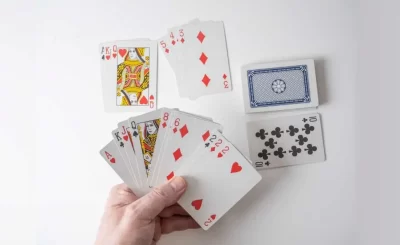This is a critical part of any good rummy strategy — simply note how other players are throwing cards away; you learn from this and improve your own play accordingly.
Rummy requires you to organise cards correctly into pure sequences and impure runs so you have the best chance of melding and winning the game.
Pay Attention to the Discarded Cards
Rummy players have to memorise every card they (and their opponents) collect and discard – it’s an unending mental activity that helps them remember and focus. This cognitive activity reinforces memory and improves attention.
By design and its mechanics, it asks the player to notice all of the cards thrown away so as to create sequences or sets out of them. Not only can you recognize when your opponent can steal cards from you, it is also important to know how to distinguish pure sequences from impure sequences; you must first watch what your opponent discards.
A pile you discard can be extremely useful in telling you your opponents’ plans and cards. You should pay close attention to which cards are being removed, what suits are being dealt and what deck is left; this will allow you to determine the probability of completing a meld and seize on opportunities as they present themselves – this play can take you from beginner to expert in no time!
Observe Your Opponents’ Moves
Watching your opponents will also allow you to learn valuable information about what they do and are good at, as well as optimize your own play accordingly. If, for example, they seem to play defensively, with a pile of cards rather than throwing them away for melds, you can adapt your game accordingly.
Monitoring your opponents discards will allow you to determine whether or not they’re stashing particular cards for melds, and when to dump cards in advance that could slow down opponents and accelerate your own. Readjusting probabilities with new data allows you to move with changing game conditions, keeping one step ahead of your competitors.
Having a mental strategy is the key to Rummy mastery as it will make you make better choices which can boost your play and improve your chances of taking over the card table. If you’re dedicated and patient with your strategy, you can play sets or sequences more often and have a better shot at winning.
Keep Track of the Discarded Cards
Rummy requires counting cards that are knocked back to determine your opponents’ play. In order to achieve this, a good memory and the ability to be able to sneak around and scan your discard pile without divulging your plan are essential to success.
When your opponents discard cards, and when you declare them, you can gauge how strong their melds are. For example, if they seem to be building a stack of high cards that you want to break by redrawing from another suit can demonstrate how you can go from the inexperienced beginner to the pro player who knows how to use probabilities strategically. With tweaking and tuning your playstyle, you’ll be a knowledgeable pro in no time!
Rummy is a game of cards that demands judgment and strategy. From building sets and sequences to predicting opponents’ moves, Rummy demands that players figure out the best path forward in order to prevail.
Be Flexible and Adaptable
Rummy is a game of luck and strategy, played around the world as a card game. In the recent past, it’s been taking off at a fast rate as players continue to refine their skills and push the game to the next level.
The essence of any winning rummy game is adaptability: you have to be able to adjust your strategy according to what cards your opponents are throwing away and react accordingly. Responsiveness is planning – reacting immediately can make your life and unpredictable circumstances easier to handle.
It also can help you to become disciplined and strategic – two essential life skills to learn how to manage time and focus. In addition, this game teaches risk and reward evaluations that could be of benefit during your career; you have to make educated discard decisions that delay other players’ melds while speeding up yours.







